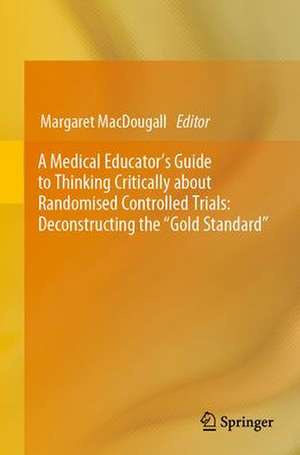A Medical Educator's Guide to Thinking Critically about Randomised Controlled Trials: Deconstructing the "Gold Standard"
Editat de Margaret MacDougallen Limba Engleză Hardback – 31 mai 2024
Rather than compete with the proliferating methodological literature on RCT designs, this book focuses on cultivating a healthy skepticism among developing health professionals to support critical appraisal of their own and published work on RCTs at a fundamental level, including through a more informed understanding of the place of subgroup analyses in sound statistical inference. Management of the positive predictive value in the statistical analysis of RCT findings is included as an important topic for contemporary medical curricula. In comparing RCTs with non-randomised studies, a search for empirical evidence for the superiority of RCTs is initiated, pointing to the need for further work to confirm what form this evidence should take.
Medical educators will find a wealth of reasons to encourage their students to think more critically about how the RCT operates in practice as a gold standard.
Preț: 728.28 lei
Preț vechi: 888.14 lei
-18% Nou
Puncte Express: 1092
Preț estimativ în valută:
139.38€ • 144.97$ • 115.06£
139.38€ • 144.97$ • 115.06£
Carte tipărită la comandă
Livrare economică 14-28 aprilie
Preluare comenzi: 021 569.72.76
Specificații
ISBN-13: 9783031258589
ISBN-10: 3031258584
Ilustrații: XX, 180 p. 10 illus.
Dimensiuni: 155 x 235 mm
Greutate: 0.46 kg
Ediția:2024
Editura: Springer International Publishing
Colecția Springer
Locul publicării:Cham, Switzerland
ISBN-10: 3031258584
Ilustrații: XX, 180 p. 10 illus.
Dimensiuni: 155 x 235 mm
Greutate: 0.46 kg
Ediția:2024
Editura: Springer International Publishing
Colecția Springer
Locul publicării:Cham, Switzerland
Cuprins
RCTs from within: The influence of scientific rigour, randomisation and chance on the credibility of reported findings.- Answering criticisms of randomised controlled trials.- Logical fallacies and the misuse of RCT findings: Lessons from diagnostic statistics.- Increasing the Positive Predictive Value in RCTs: Lessons from Bayes’ Rule.- What do randomised trials tell us, and could they tell us more? Looking within and beyond the study sample.- What can comparisons of randomised and non-randomised studies tell us?.- Multi-studies: A novel approach to addressing irreplicability in RCTs.
Notă biografică
Margaret MacDougall is a senior lecturer in medical statistics and researcher in education at the Usher Institute, Edinburgh Medical School. She developed an interest in philosophy early on in her career through her PhD research in mathematical logic, constructive set theory and the philosophy of mathematics. She has conceived and led eleven funded projects in medical education and statistics and supervised research staff and students at undergraduate and postgraduate levels through various spin-off projects. Margaret seeks to use her research to promote curriculum innovation and enhance student learning in statistics at undergraduate and postgraduate levels and has published on an international scale in the fields of education, medicine, philosophy and statistics. She has served as an invited speaker, chair and conference organiser at various local, national and international events relating to statistics, and learning and teaching in higher education. Currently, she serves as Vice Chair of the Teaching Statistics section of the Royal Statistical Society.
Textul de pe ultima copertă
Drawing on the statistical and philosophical expertise of its authors, this book is designed to improve understanding and use of randomised controlled trials (RCTs) among health professionals. It is intended for use primarily by medical educators involved in teaching statistics and evidence-based medicine (EBM) to medical students, junior doctors and other health professionals. However, each of the chapters serves a wider range of interests, including the practical needs of physicians in interpreting research evidence to support clinical decision making and the teaching needs of philosophers of medicine who want to more fully appreciate how RCTs work in practice and provide engaging examples for their students.
Rather than compete with the proliferating methodological literature on RCT designs, this book focuses on cultivating a healthy skepticism among developing health professionals to support critical appraisal of their own and published work on RCTs at a fundamental level, including through a more informed understanding of the place of subgroup analyses in sound statistical inference. Management of the positive predictive value in the statistical analysis of RCT findings is included as an important topic for contemporary medical curricula. In comparing RCTs with non-randomised studies, a search for empirical evidence for the superiority of RCTs is initiated, pointing to the need for further work to confirm what form this evidence should take.
Medical educators will find a wealth of reasons to encourage their students to think more critically about how the RCT operates in practice as a gold standard.
Rather than compete with the proliferating methodological literature on RCT designs, this book focuses on cultivating a healthy skepticism among developing health professionals to support critical appraisal of their own and published work on RCTs at a fundamental level, including through a more informed understanding of the place of subgroup analyses in sound statistical inference. Management of the positive predictive value in the statistical analysis of RCT findings is included as an important topic for contemporary medical curricula. In comparing RCTs with non-randomised studies, a search for empirical evidence for the superiority of RCTs is initiated, pointing to the need for further work to confirm what form this evidence should take.
Medical educators will find a wealth of reasons to encourage their students to think more critically about how the RCT operates in practice as a gold standard.
Caracteristici
Refreshingly thorough and honest analysis of the RCT as a gold standard Provides topical examples and checklists to enhance critical appraisal of RCTs Challenges conventional perceptions of RCTs using philosophical and statistical insights
